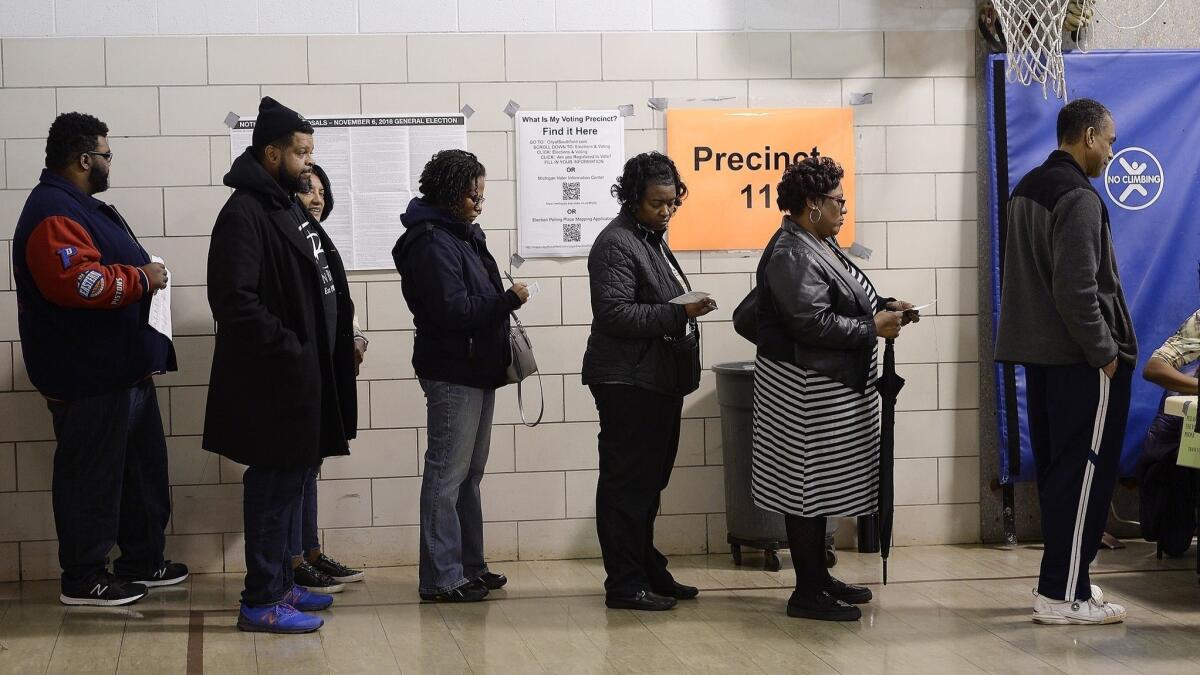Op-Ed: Republican attacks on state voting-rights victories threaten our democracy

- Share via
One of the most under-covered stories of 2019 is the determination of Republican state legislatures to roll back hard-fought historic voting-rights victories and place entirely new roadblocks between citizens and their government.
These moves are being made in response to what may be the biggest story of last fall’s election: How determined U.S. citizens successfully fought back — against gerrymandering, racially motivated voter-identification bills, felony disenfranchisement and more — to fix a rigged system.
In Missouri, more than 60% of voters battled against gerrymandering and pay-to-play politics and won a landmark victory for clean, transparent government. A supermajority of Floridians restored voting rights to more than a million former felons who have served their time and paid their debt to society. In zinfandel red Idaho, where the Legislature refused to expand Medicaid under the Affordable Care Act, young people organized petition drives, pushed ballot initiatives and won.
Republicans seek to build barriers that silence the will of the people, entrench themselves in power and make it harder for citizens to exercise their most fundamental right of all — the right to vote. In the process, they are gutting the very notion of government by and for the people, and with the consent of the elected.
The right to vote is the jewel of citizenship. Politicians who tarnish it debase democracy and American ideals.
Republicans in Missouri launched a stealth attack on the “Clean Missouri” amendments that mandated a new nonpartisan legislative map-making process and an end to special-interest donations over $5. Legislators want to amend the citizen initiative and essentially reverse it, returning control over drawing district lines to the legislators. Senate Republicans in Michigan have also sought to undercut that state’s independent redistricting commission, passed overwhelmingly by voters last fall, by zeroing out its line item in the secretary of state’s budget.
The Florida Legislature, meanwhile, worked quickly to block about 80% of former felons from once again participating in our democracy. The lawmakers moved to require full restitution of fines and fees — themselves unjust and unequally applied by race — basically enacting an ugly, modern-day poll tax that hits hardest against the poor and minorities.
The Idaho Legislature went a step further: Republicans not only circumvented the people’s will by adding onerous work requirements to Medicaid expansion and demanding detailed information about previous drug use. They also tried to kill the very notion of citizen initiatives by nearly doubling the number of signatures needed while slashing by two-thirds the number of available days to collect them.
Gerrymandered legislatures, as well as entrenched politicians in one-party states, clearly fear the public demanding a seat back in the process. Arkansas and Utah have enacted similar measures. It’s probably no coincidence that activists hope to have redistricting reform on the ballot in Arkansas this year, and that it passed in Utah last year.
More than 100 proposals — more than in the previous two years combined — have been introduced to make it more difficult to put a ballot initiative or constitutional amendment before the people in states across the country, according to a commentary in USA Today.
Those states include Michigan, Ohio and Florida, where voters successfully reformed redistricting or expanded voting rights in 2018. But in states such as Arizona and Texas — where Democrats made crucial gains in 2018 that could be put in play by changing demographics — Republicans have launched an advanced assault on voting rights.
Texas would make it a felony for anyone to cast an ineligible ballot, even by accident, and subject anyone who puts the wrong ZIP Code or any other incorrect information on a voting application to criminal charges and jail time. Arizona wants to restrict the ability of citizens to vote early. Tennessee, meanwhile, seeks to make it harder for activist groups to conduct voter-registration drives by requiring expensive new training and fines for submitting incomplete applications. “We have never seen a bill like this on the floor, until we dared to register 86,000 black and brown people to vote,” Tequila Johnson of the Equity Alliance told NPR. “This screams racism.”
Enter the Fray: First takes on the news of the minute from L.A. Times Opinion »
It doesn’t just scream — it practically howls. But though it is easy to see through these naked power grabs and brutally anti-democratic efforts to reinforce minority rule, these never-ending schemes only get harder to stop, especially because the U.S. Supreme Court gutted key enforcement provisions of the Voting Rights Act in 2013 in Shelby County vs. Holder.
Gerrymandered legislatures protect politicians from the ballot box and entrench them in power, often providing Republican supermajorities even when Democrats win more votes. Those politicians then insulate themselves further from insolent voters who attempt to win back their voice through initiatives, or by making it easier to grow the electorate.
The right to vote is the jewel of citizenship. Politicians who tarnish it debase democracy and American ideals. The 2018 elections showed that determined citizens, standing together, can defeat the toughest structural problems. But the fight for the vote has never been easy, and never in our history have politicians stopped constructing new barriers.
Democracy has always been a battle, with every precious and precarious victory threatened and undercut by politicians eager to retain power by rigging the rules. This feels less like a battle, however, and more like a new permanent state of war over democracy, with one side willing to bust every norm and American ideal in the service of installing an enduring form of minority rule.
David Daley is the author of “Ratf**ked: Why Your Vote Doesn’t Count” and a senior fellow at FairVote.
More to Read
A cure for the common opinion
Get thought-provoking perspectives with our weekly newsletter.
You may occasionally receive promotional content from the Los Angeles Times.









